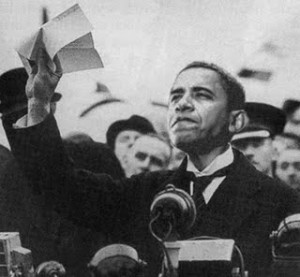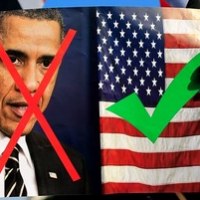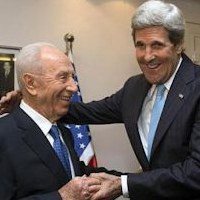![]()
Sunday, September 15, 2013 | RubinReports | By Barry Rubin
Last week President Barack Obama proposed a policy of allying with the Muslim Brotherhood, the Salafists, and al-Qaida against Syria.
What is amazing about Islamism parallels the debate on appeasing — rather than opposing — Hitler based on newly released British intelligence documents.
One of the themes then, as now, was to give everyone the benefit of the doubt, no matter what a violent and threatening past he had. Ideology is ignored.
The day after Hitler took power, on January 30, 1933, the Times of London, (a newspaper like the New York Times) editorialized.
“That Herr Hitler who leads the strongest party in the Reichstag and obtained almost one third of the votes at the last election should be given the chance at showing that he is something more than an orator and an agitator was always desirable.”
About the same day, Guy Liddell of British intelligence, responsible for Germany, wrote in a secret report, that while he knew about antisemitic persecution in the new Germany: there had indeed been too much Jewish political power there. Liddell was strongly anti-Nazi and not personally antisemitic but he was a supporter of the appeasement bloc in the British government.
As opposed to the British international intelligence (MI-6, the equivalent of the CIA), British counterintelligence (MI-5, the equivalent of the FBI), wanted a strong stand against Germany:
“No reliance can be placed on any treaty which has been signed, or may be signed, by Germany or Italy….”
It took what Hitler wrote in Mein Kampf seriously. He intended to conquer Europe.
One reason MI-6 knew this was that it listened to anti-Nazi German agents. The main hero was Wolfgang zu Putlitz, a diplomat at the German embassy in Britain and later Holland. Along with John “Klop” Ustinov (father of the actor Peter Ustinov) the two men had no illusions about the Nazis. In fact they nagged British intelligence all the time about the need to get tough.
So did the second main agent, General Baron von Schweppenburg, the German military attaché in London. In the summer of 1938 he told Putlitz, “We simply must convince the British to stand firm, if they give in to Hitler now there will be no holding him.”
But although the British government was repeatedly warned the prime minister and government knew better. There were two factions — which is more than the U.S. government has now regarding radical Islamism.
One of the factors in British policy was a hope that if the Germans were flattered and treated properly, they would not be aggressive. Another reason was that the British felt guilty that they had formerly treated Germany so badly after World War One (Germanophobia?)
An MI-6 document of the time said:
“There have been times that he [Putlitz] has said that the English are hopeless and it is no use trying to help them to withstand the Nazi methods which they so obviously fail to understand.…”
It was these factors that convinced Hitler, in the words of a contemporary MI-6 report, that Britain “decadent” and lacks “the will and power to defend” itself.
Hitler himself was directly quoted as saying:
“It is astounding how easy the democracies make it for us to reach our goal.”
He was also directly quoted as calling Chamberlain an “arsehole.” ( I wonder what Putin said about Obama.)
The prime minister’s own press aide, George Steward, told the German press attaché — no kidding — that Britain “would give everything Germany asked for the next year.”
Meanwhile, Prime Minister Neville Chamberlain, according to a senior British diplomat,
“was completely bewitched by his German friends and reported myopically that ‘the German compass was pointed toward peace.’”
With Obama’s friends telling him that the Islamists’ compass was pointed toward peace guess that proves the price of having an incompetent leader.
As late as February 19, 1940, Chamberlain wrote,
”All the information I seem to get points to peace.”
In fact, we know this is not true. Even his former allies were jumping ship, horrified by what they had done and knowing war had become inevitable.
Robert Vansitart, a foreign policymaker who was one of the leaders of the tough position, along with Winston Churchill and Anthony Eden, wrote:
“Nothing seems any good. It seems as if nobody will listen to or believe me.”
I’ve had days like that myself. But then the United States has never allied with the Muslim Brotherhood, the Salafists, or in Syria, al-Qaida.
Oh, and at least a lot of courageous people in the establishment denounced the policy and even risked their careers to do it.
To quote another expert dictator and predecessor of Putin:
“Don’t scare anyone. But once you gain ground then move ahead. You must utilize as many people as possible who may be of use to us.” — Joseph Stalin to future Communist dictator of Hungary Rakosi, December 5, 1944. Cited below page 23. Quoted in Victor Sebestyen, Twelve Days: Revolution 1956, p. 24.
![]()
- All quotes from Christopher Andrew, The Defense of the Realm, The Authorized History of MI5, Penguin Books (London, 2010).
- Pulitz and Ustinov were given safe haven in Britain; General Baron von Schweppenburg fought in the war for Germany and later helped rebuild the West German army.
Barry Rubin is director of the Global Research in International Affairs (GLORIA) Center and editor of the Middle East Review of International Affairs (MERIA) Journal. His next book, “Nazis, Islamists and the Making of the Modern Middle East,” written with Wolfgang G. Schwanitz, will be published by Yale University Press in January 2014. His latest book is “Israel: An Introduction,” also published by Yale. Thirteen of his books can be read and downloaded for free at the website of the GLORIA Center including “The Arab States and the Palestine Conflict,” “The Long War for Freedom: The Arab Struggle for Democracy in the Middle East” and “The Truth About Syria.” His blog is Rubin Reports. His original articles are published at PJMedia.



 RSS
RSS



















Latest Comments
Hello Mike, Thank you for your positive feedback to the article. I felt there wasn’t too much critical analysis of ...
Thanks for this considered and well constructed article. A follow up article on the manner in which the editorial contro...
THE CLUELESSNESS OF CLAIMING THAT OBAMA'S MIDDLE EAST POLICIES WERE A FAILURE CANNOT BE FURTHER FROM THE TRUTH, WHAT THE...
As long as Obama is the president of the usa do not trust the us government......
Thank you for an good read....